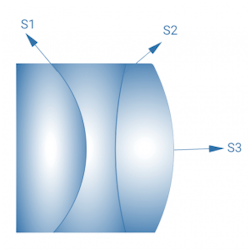Case Study: Triplet Apochromat Lens in VR Headsets
The integration of the triplet apochromat lens into VR headsets marks a significant milestone in immersive technology. Renowned for its unparalleled visual clarity and realism, this lens minimizes chromatic aberration, delivering superior image quality across various fields such as photography, astronomy, and medicine.
In VR headsets, the triplet apochromat lens ensures optimal image quality, reducing chromatic aberration to provide users with clearer and more immersive experiences. Its application in VR sets a new standard for visual enjoyment, making it ideal for gaming, movie-watching, and virtual tourism.
Production & Design
Unlike traditional lenses, the triplet apochromat lens incorporates both spherical and aspherical surfaces to achieve superior optical performance. Advanced manufacturing processes, including CNC machining and specialized polishing, ensure strict shape and surface accuracy, meeting the demands for optimal optical performance.
To read the entire case study, visit Shanghai Optics' website.

